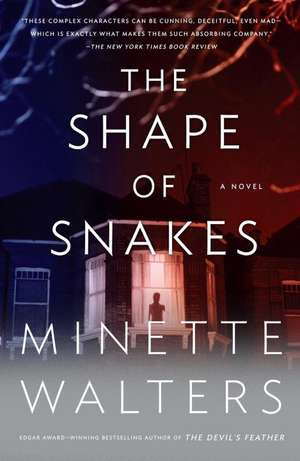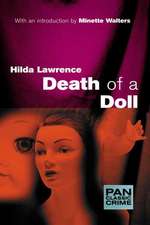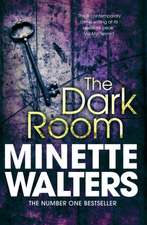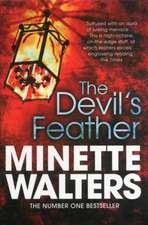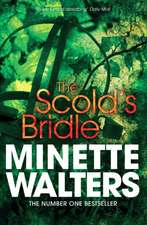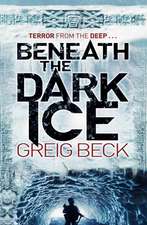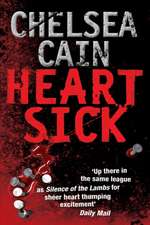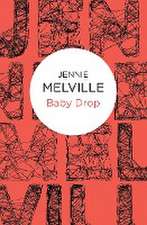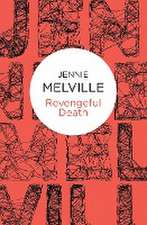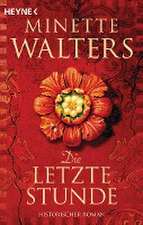The Shape of Snakes
Autor Minette Waltersen Limba Engleză Paperback – 31 ian 2008
Mrs. Ranelagh has never stopped thinking about the dead body she found in the gutter twenty years ago, during Britain’s Winter of Discontent. “Mad Annie,” as she was known, was the only black resident of her West London neighborhood and openly despised by the community. The police called her death an accident, but Mrs. Ranelagh has always suspected it was murder. However, her pleas for an investigation were met with a vicious hate campaign that drove her and her husband from the country. Now, determined to uncover the truth, Mrs. Ranelagh has returned to England, where she quickly discovers a sordid trail of domestic violence, racism and adultery that shockingly could lead back to her own family.
Preț: 82.03 lei
Nou
15.70€ • 16.22$ • 13.07£
Carte indisponibilă temporar
Specificații
ISBN-10: 0307277119
Pagini: 370
Dimensiuni: 140 x 203 x 20 mm
Greutate: 0.35 kg
Editura: Vintage Books USA
Notă biografică
Extras
I could never decide whether “Mad Annie” was murdered because she was mad or because she was black.We were living in southwest London at the time and I remember my shock when I came home from work one wet November evening to find her collapsed in the gutter outside our house. It was 1978-the winter of discontent-when the government lost control of the trade unions, strikes were an everyday occurrence, hospitals ceased to cater to the sick and uncollected rubbish lay in heaps along the pavement. If I hadn't recognized her old plaid coat I might have ignored her, thinking the bundle in the gutter was a heap of discarded clothes.
Her real name was Ann Butts and she was the only black person in our road. She was a well-built woman with a closed expression and a strong aversion to social contact, who was known to enjoy a drink, particularly Caribbean rum, and was often to be found sitting on the pavement in the summer singing gospel hymns. She had acquired the “Mad” label because she made strange faces and muttered to herself as she scurried along in a bizarre dot-and-carry trot that suggested a child playing “Ride a cock horse to Banbury Cross.”
Little was known about her circumstances except that she had inherited her house and a small independent income upon her mother's death and, apart from a menagerie of stray cats that had taken up residence with her, she lived alone. It was said that her mother had been madder than she was and that her father had abandoned them both because of it. One of the long-term residents of Graham Road swore blind that Mrs. Butts senior used to shout obscenities at passersby and twirl like a dervish when the mood was on her, but as Mrs. Butts had been dead some time the story had undoubtedly grown in the telling.
I didn't believe it any more than I believed the rumors that Annie kept live chickens inside her house, which she killed by boiling, feathers and all, for her own and her cats' supper. It was nonsense-she bought her meat, dead, at the local supermarket like everyone else-but her close neighbors talked about rats in her garden and a terrible smell coming from her kitchen, and the story of live chickens was born. I always said she couldn't have rats and cats, but no one wanted to hear the voice of reason.The same neighbors made life difficult for her by reporting her regularly to the local council, the RSPCA and the police, but nothing came of their complaints because the council couldn't force her out of her own house, the cats were not ill-treated and she wasn't mad enough to be committed to an institution. Had there been family and friends to support her, she might have taken her harassers to court, but she was a solitary person who guarded her privacy jealously. At various times health visitors and social workers made unsuccessful attempts to persuade her into sheltered accommodations, and once a week the local vicar knocked on her door to make sure she was still alive. He was always cursed loudly for his trouble from an upstairs window, but he took it in stride, despite Annie's refusal to go anywhere near his church.
I knew her only by sight because we lived at the other end of the road but I never understood why the street took against her so strongly. My husband said it had to do with property values, but I couldn't agree with him. When we moved onto Graham Road in 1976 we had no illusions about why we could afford it. It had a Richmond postcode but it was very definitely “on the wrong side of the tracks.” Built for laborers in the 1880s, it was a double row of two-up, two-down terraced housing off the A316 between Richmond and Mortlake, and no one who bought a house there expected to make a fortune overnight, particularly as council-owned properties were seeded among the privately owned ones. They were easily identified by their uniform yellow doors and were looked down on by those of us who'd bought our houses because at least two of them held problem families.
Personally, I thought the way the children treated Annie was a better barometer of the adults' feelings. They teased her mercilessly, calling her names and aping her dot-and-carry trot in a cruel demonstration of their right to feel superior, then ran away with squeals of fear if their pestering irritated her enough to make her raise her head and glare at them. It was a form of bearbaiting. They goaded her because they despised her, but they were also afraid of her.
In retrospect, of course, I wish I'd taken up cudgels on her behalf but, like everyone else who stayed silent, I assumed she could take care of herself. Certainly the children weren't alone in finding her intimidating. On the one occasion when I made an attempt to speak to her, she rounded on me angrily, calling me “honky,” and I didn't have the courage to try again. Once in a while afterward I would come out of my front door to find her staring up at our house, but she scampered off the minute she saw me and my husband warned me not to antagonize her any further. I told him I thought she was trying to say “sorry,” but he laughed and said I was naïve.
On the night she died a freezing rain was falling. The hunched trees that lined the pavements were black and sodden with water and made the street look very grim as I turned onto it from the main road. On the other side, a couple paused briefly under one of the few lampposts, then separated, the man to walk ahead, the woman to cross on a diagonal in front of me. I pulled up my coat collar to shield my face from the stabbing rain before stepping off the curb to run through sheets of water toward my house.
I found Annie lying on the edge of the yellow lamplight in a space between two parked cars and I remember wondering why the couple hadn't noticed her. Or perhaps they had chosen to ignore her, believing, as I did, that she was drunk. I stooped to rock her shoulder but the movement caused her to cry out and I stepped back immediately. She lay with her head cradled in her arms, her knees drawn up tight against her chin and I assumed she was protecting herself from the rain. She smelled powerfully of urine, and I guessed she'd had an accident, but I shrank from the responsibility of cleaning her up and told her instead that I was going home to call for an ambulance.
Did she think I wouldn't come back? Is that what persuaded her to uncradle her poor head and lift her pain-filled eyes to mine? I have no idea if that was the moment she died-they said afterward it probably was, because her skull was so badly fractured that any movement would have been dangerous-but I do know I will never experience such an intense intimacy with another human being again. I felt everything she felt-sorrow, anguish, despair, suffering-most poignantly, her complete bewilderment about why anyone would want to kill her. “Was I unlovable?” she seemed to be asking. “Was I unkind? Was I less deserving because I was different?” Many hours later, the police questioned my incoherent ramblings. Did Miss Butts actually say these things? No. Did she accuse someone directly? No. Did she speak at all? No. Did you see anyone run away? No. So there's no evidence to support your assertion of murder other than a puzzled look in her eyes? No. I couldn't blame them for being skeptical. As they pointed out, it was unlikely I could have interpreted Annie's look with any accuracy. Sudden death was always difficult to come to terms with because the emotions surrounding it are complex. They tried to convince me it was heightened imagination following my shock at finding her and offered me post-traumatic stress counseling to get over it. I refused. I was only interested in justice. As far as I was concerned, whatever residual shock I felt would vanish the minute Annie's murderer or murderers were caught and convicted.
They never were.
The coroner's verdict, based on the postmortem results and witness statements taken during a two-week police investigation, was death by misadventure. He painted a picture of a woman whose hold on reality was poor even when she was sober but who, on the night in question, had been drinking heavily. Her blood showed a high level of alcohol and she was seen staggering around the road by passing motorists and several neighbors. One said he had tried to persuade her to go home but gave up when she started swearing at him. Her injuries-in particular the fractures to her skull and broken left arm-were consistent with a glancing blow from a heavy vehicle, probably a truck, which had thrown her between the stationary cars and against the lamppost as it passed. Due to the heavy rainfall that night, it was unsurprising that no blood, hair or tissue traces were discovered on the lamppost.
The fact that no driver had come forward to admit liability was not considered significant either. It was dark, pouring with rain, parked vehicles restricted visibility and the street lighting was inadequate.With a critical reference to council officers who allowed badly lit streets in poorer areas to become rat-runs for heavy traffic, the coroner endorsed the police view that Miss Butts had stumbled off the pavement into the side of a passing truck without, in all probability, the driver being aware of the contact. It was impossible to establish when the accident occurred, although due to the seriousness of Miss Butts's injuries it was doubtful she could have survived more than fifteen to thirty minutes.
It was a sad case, the coroner said, which highlighted the need to have an element of compulsion in the treatment of vulnerable people in a modern society. There was clear evidence-the squalid state of her house when the police entered it the day after her death; her alcohol dependency-that she was unable to look after herself properly, and it was his opinion that if social services and health workers had been able to force Miss Butts to accept help, she would still be alive today. The witness who found Miss Butts's body had alleged a racist campaign against Miss Butts by her neighbors, but there was no evidence to support this and the coroner accepted that her neighbors' actions had been prompted only by concern for her welfare. In conclusion and despite the same witness's emotional insistence that Miss Butts had been delib-erately pushed in front of an oncoming vehicle, the coroner's verdict was unequivocal. Death by misadventure. Case closed . . .
I fell ill shortly afterward and took to my bed for several days. I told the doctor who came to see me that I had the flu, but he diagnosed depression and prescribed tranquilizers, which I refused to take. I became frightened of the telephone; every sound from the road had me jumping out of my chair. My husband, Sam, was initially sympathetic but soon lost interest when I began sleeping in the spare room and talking about rats in the downstairs lavatory. Thereafter, I developed mild agoraphobia and found it harder and harder to go to work. I was a teacher at a local comprehensive school and my overburdened colleagues were even less sympathetic than Sam when I said I felt stifled by the way the children crowded around me in the corridor. After a few weeks I ceased going in altogether.
The whole episode-from Annie's death to the loss of my job-caused a rift between me and Sam, who walked delicately around me for weeks, then took to speaking to my mother for hours on the telephone. He was careful to close the door but I could still hear most of his conversation through the paper-thin walls on the rare occasions when I bothered to listen. The phrases repeated most often were “impossible to live with . . .” “having a nervous breakdown . . .” “got a thing about rats . . .” “stupid fuss over a bloody black woman . . .” and “divorce . . .”
Some time in February my parents drove up from Hampshire where they were then living. Sam had moved out three weeks previously to sleep on a friend's sofa, and our marriage was effectively over. Wisely, my father refused to get involved, but my mother couldn't resist taking Sam's part. She comes from that generation of women who believe that marriage is the key to a woman's happiness and she told me in no uncertain terms that if I was determined to reject Sam then I needn't look to her and my father for support. As she pointed out, I'd been deserted by my friends because my behavior was so peculiar. . . . I was rapidly becoming anorexic. . . . I had no job . . . worse, no prospect of a job while I remained firmly closeted in the house. What was I planning to do? Where was I planning to go?
I expressed only mild annoyance that she believed everything Sam told her, and suggested she question a man's honesty for once in her life. It was like a red flag to a bull.We couldn't talk about sex-or lack of it, Sam's real bone of contention with me-because it was a taboo subject between us, so instead she lectured me on the way I was letting myself go, my failure to cook proper meals for my hardworking husband, my lackluster approach to cleaning the house and inevitably my absurd obsession with the death of a colored person. “There might be some sense in it if she'd been one of us,” she finished tartly, “but she wasn't even English . . . just another wretched immigrant living off benefit and clogging up the health service with imported diseases. Why we ever let them in, I can't imagine, and for you to jeopardize your marriage-” She broke off abruptly. “Can't you see how ridiculous you're being?” I couldn't, but it wasn't something I was prepared to discuss with her. Predictably, my silence persuaded her she'd won the argument when all she'd really achieved was to prove to me how little I cared about anyone's opinion but my own. In an odd way her complete lack of sympathy was more liberating than distressing because it made me realize that control rests with whomever worries least about being seen to exercise it, and with cold deliberation I agreed to mend fences with my husband if only to keep a roof over my head. Three months later, Sam and I moved abroad.
Recenzii
“Minette Walters is a master at building engrossing tales around a single, life-shattering event.” —The Washington Post Book World
“An intricate, unpredictable, and engrossing tale of passion and revenge.”
—The San Diego Union Tribune
“A harrowing thriller. . . Seethe[s] with rage and violence . . . A terrific example of psychological suspense.”
—Chicago Tribune
Descriere
A classic novel from the bestselling crime writer - now in an arresting new package
November 1978. Britain is on strike. The dead lie unburied, rubbish piles in the streets - and somewhere is West London a black woman dies in a rain-soaked gutter.
Her passing would have gone unmourned but for the young woman who finds her and who believes - apparently against reason - that Annie was murdered. But whatever the truth about Annie - whether she was as mad as her neighbours claimed, whether she lived in squalor as the police said - something passed between her and Mrs Ranelagh in the moment of death which binds this one woman to her cause for the next twenty years.
But why is Mrs Ranelagh so convinced it was murder when by her own account Annie died without speaking? And why would any woman spend twenty painstaking years uncovering the truth - unless her reasons are personal . . . ?
